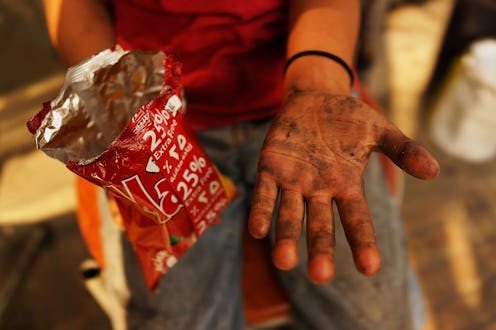News
UN Makes Record Appeal to Help Syria
As the violent conflict continues to rage on in Syria, with 76 people being killed only yesterday by air strikes in the northern city of Aleppo, the humanitarian situation in the country has now officially reached critical levels. In addition to being displaced, killed, besieged, possibly diseased and currently freezing, many Syrians are now on the brink of starvation. In response, the United Nations has announced a record-breaking aid appeal to help the escalating crisis — on Monday, the group will be requesting an unprecedented $6.5bn for Syrian civilians.
"We're facing a terrifying situation here where, by the end of 2014, substantially more of the population of Syria could be displaced or in need of humanitarian help than not," said the UN High Commissioner for Refugees, Antonio Guterres."This goes beyond anything we have seen in many, many years, and makes the need for a political solution all the much greater."
Roughly $2.3bn of the aid money would go to civilians inside the country, but the rest would go to the millions of Syrian refugees in neighboring Lebanon, Turkey and Jordan. The aid money is direly needed. According to a survey by the International Rescue Committee, a large percentage of the Syrian population is now literally on the brink of starvation. In some areas, the price of bread has risen by a jaw-dropping 500 percent; four out of five Syrians are more afraid of running out of food than of anything else, including the conflict's violence.
But the situation can't easily rectified, even with that much money; humanitarian aid is in fact extremely difficult to deliver in the tense political region. Complications arising from rebels groups' refusal to cooperate and government bureaucracy make aid operations frequently close to impossible. Often, President Bashar al-Assad's administration will often use the threat of denying visas to discourage international agencies, who are legally obligated to work with the Syrian government.
"According to the Syrian government's official position, humanitarian agencies and supplies are allowed to go anywhere, even across any frontline," said Ben Parker, formerly part of the U.N. Office for the Coordination of Humanitarian Affairs (OCHA) in Syria. "But every action requires time-consuming permissions, which effectively provide multiple veto opportunities."
This is in addition to the fact that, according to UN estimates, roughly 250,000 Syrians are living under siege, 45,000 of those are encircled by anti-Assad rebel groups. Even medical aid is hard to deliver, with both opposition and government forces seeing the act as a support for the other side.
"Where we haven't been particularly successful is in increasing our medical activities in Syria, which remain below our expectations," said the president of the International Committee of the Red Cross. "On both sides we are struggling with the argument that whatever medical aid is brought to one part or the other is interpreted as an indirect military support to the other side."
On Monday, though, the UN sent its first food and winter supplies by air to the northeastern part of the country, and will continue to do so for the next 12 days. According to the UN's World Food Program, the food provided will feed at least 6,000 Syrian families for the rest of the month. Which is, you know, something. The two and a half year conflict has caused roughly 6.3 million people to be nternally displaced, and the deaths of over 100,00 people — 11,000 of whom were children. If a diplomatic solution is not found in Geneva this January, soon, according to Middle East and Northern Africa director for the U.N. Children's Fund UNICEF, "the time will come that whatever aid you bring it is far too late and the scars on children will be far too deep to repair."
